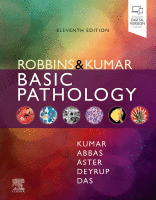Physical Address
304 North Cardinal St.
Dorchester Center, MA 02124

The contributions of Dr. Anthony Chang, Department of Pathology, University of Chicago, and Dr. Zoltan Laszik, Department of Pathology, University of California San Francisco, to previous editions of this chapter are gratefully acknowledged. The well-known quotation “What is man…but an…

The contributions to this chapter by Dr. Aliya Husain, Department of Pathology, University of Chicago, Chicago, Illinois, in several previous editions of this book are gratefully acknowledged. The major function of the lung is to provide the body with oxygen…

The hematopoietic and lymphoid systems are affected by a wide spectrum of diseases. One useful way to organize these disorders is based on whether they primarily affect red cells, white cells, or the coagulation system, which includes platelets and clotting…

The heart is a truly remarkable organ, beating more than 40 million times per year and pumping over 7500 liters of blood a day; in a typical life span, its cumulative output would fill three supertankers. The cardiovascular system is…

Vascular diseases are responsible for some of the most common and lethal conditions afflicting humans. Although most clinically significant disorders involve arterial lesions, venous pathologies can also wreak havoc. Two types of vascular lesions cause disease: Narrowing or complete obstruction…

Most diseases are influenced by environmental factors, and some are directly caused by environmental insults. Broadly defined, the ambient environment encompasses the various outdoor, indoor, and occupational settings in which humans live and work. In each of these settings, the…

Cancer is the second leading cause of death in the United States; only cardiovascular diseases exact a higher toll. Cancer is not one disease but many, all sharing a profound dysregulation of growth. Some types of cancer are curable, while…

Immunity refers to protection against infections. The immune system is the collection of cells and molecules that are responsible for defending the body against the countless pathogens that individuals encounter. Defects in the immune system are the cause of immunodeficiency…

In this chapter we discuss genetic and pediatric diseases together, because many disorders of childhood are of genetic origin. However, it must be borne in mind that not all genetic disorders manifest in infancy and childhood, and, conversely, many pediatric…

The health of cells and tissues depends on the circulation of blood, which delivers oxygen and nutrients and removes wastes generated by cellular metabolism. Under normal conditions, as blood passes through capillary beds, there is little net movement of water and…